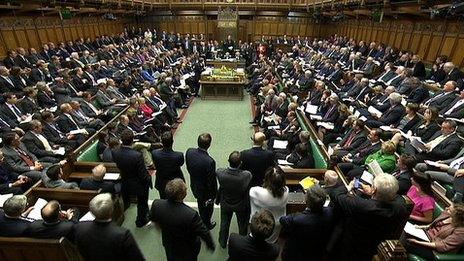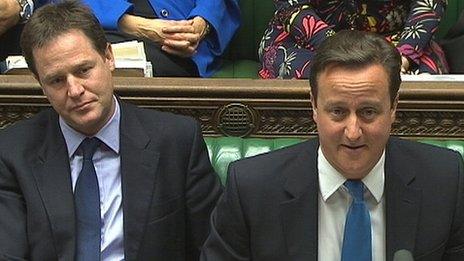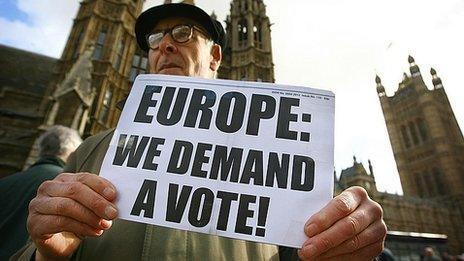Labour would consider split of powers between UK and EU
- Published
Shadow Foreign Secretary Douglas Alexander says that it "wouldn't make sense" to leave the European Union but it does need reform
Labour would be prepared to consider the case for reclaiming some powers from Europe, shadow foreign secretary Douglas Alexander has said.
His party would take a "hard-headed" approach to negotiations on the future shape of the EU arising from the eurozone crisis, he said in a speech.
But he said there were more immediate priorities and the UK must make the case anew for being "active" in Europe.
David Cameron has said Labour do not believe the EU has too much power.
Labour say the government has not been doing enough to help resolve the eurozone debt crisis and limit the economic damage to the UK from the current instability.
They also say the coalition partners are split over whether to use the crisis to press for a return of powers to the UK.
In turn, the opposition have faced accusations that their own policy on Europe is confused and that they would be a "soft touch" when it comes to defending UK interests should countries using the single currency pursue greater integration.
'Wrong for Labour'
Speaking to a group of diplomats from Nordic and Baltic countries, Mr Alexander dismissed suggestions that Labour believed the EU could return to normal once the current turmoil had eased.
He acknowledged that traditional arguments for defending the UK's membership of the EU were no longer good enough, and that Labour's decision not to hold a referendum on the Lisbon Treaty in 2009 - although this was a decision he supported - had "heightened people's concerns" about the EU.
There was a need for fundamental reform of the way the EU operated in future, he argued, with changes to the way it spent its money, particularly in controversial areas like agriculture and fisheries.
"Even if we never promised another ounce of European integration, being the party simply intent on defending today's European status quo would be wrong for Labour and wrong for Britain," he said.
Mr Alexander said Labour would defend existing policy opt-outs secured from Brussels and would reconsider the current division of powers between there and Westminster - a key demand of most Conservative MPs and some Labour ones.
He said those actions would be part of a "challenging but realisable agenda for reform", but should not be the government's principal objective in the coming months.
"To suggest at this time that repatriation should be Britain's overriding priority - and to start these negotiations by threatening vetoes - reveals a government that misreads profoundly the risks and the realities of the present situation," he said.
"Pragmatism, not dogmatism, and a hard-headed view of Britain's national interests should be the hallmark of Britain's approach to the coming negotiations".
'Lost faith'
The government's focus should be on making the single market function better so that it delivers greater benefits to British business and consumers, he said, protecting the country's interests in key areas such as banking and insurance and "amplifying" its voice on global trade and copyright issues.
Rejecting calls for outright withdrawal from the EU, he added: "To cut ourselves off from a market of £500m generating £10 trillion would not just say that we had lost faith in Europe.
"It would say we had lost faith in the ability of British companies to ever out-compete, out-innovate and out-think their European competitors.
"And if we are not in the room, we will not get a set of rules that work for the UK."
Nearly 20 Labour MPs defied the party leadership by calling for a referendum on the UK's membership of the EU last month.
However, this rebellion was on a much smaller scale than among the Conservatives - 80 of whose MPs voted against the government over the issue.
- Published25 October 2011

- Published26 October 2011

- Published21 May 2015
